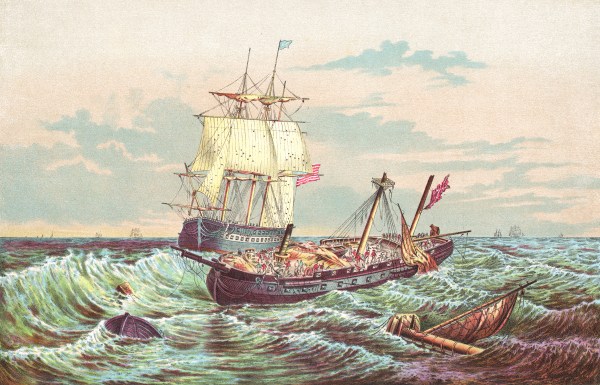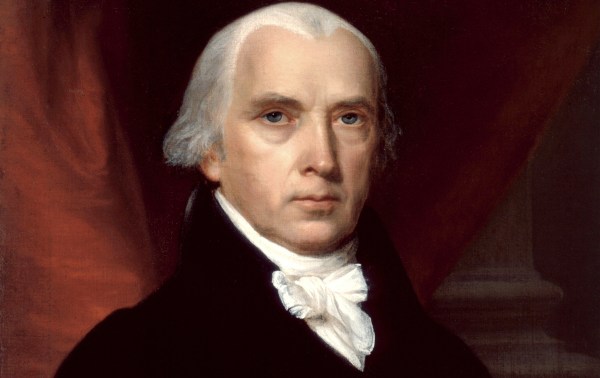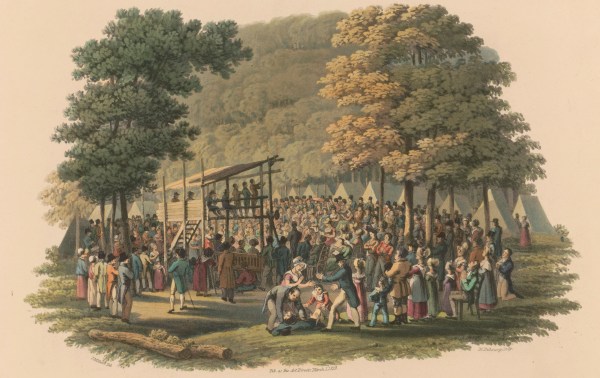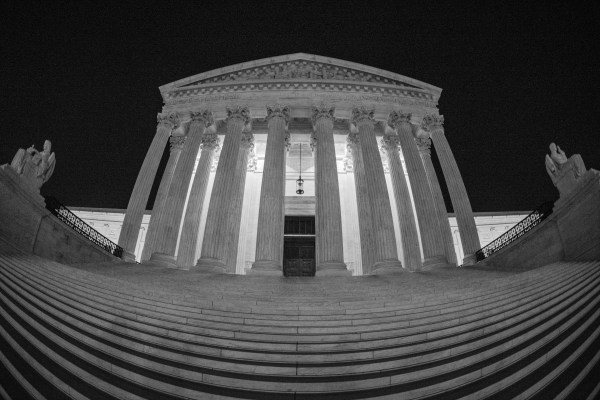In the years leading up to the American Revolution, colonial leaders enlisted several authoritative sources in their complaints against King George and the British Parliament: the Bible, the English constitution, and Enlightenment philosopher John Locke.
In fact, it is not too much to say that Locke’s political outlook framed nearly all of the core arguments for American independence. Some revisionist scholars, such as J.G.A. Pocock in The Machiavellian Moment (1975), have tried to marginalize Locke’s presence from the American story. But more recent works—including The Reception of Locke’s Politics, edited by Mark Goldie, and Political Sermons of the American Founding Era, edited by Ellis Sandoz—effectively demolish this view. Colonial assumptions about natural rights, human equality, religious liberty, government by consent, the right of revolution: Each drew heavily from Locke’s writings, which were considered mandatory reading for educated Americans.
As we’ll see, the colonists were heirs of the Lockean tradition. As a result, freedom, reason, and revelation formed a conceptual trinity in the American Revolution. The powerful alliance of these ideas helps to explain the astonishing and enduring influence of the American example.
Unfortunately, nonsense talk about the meaning and legitimacy of the American experiment is almost as ingrained in the New Right as in the progressive left. Catholic thinkers such as Patrick Deneen denounce America’s Lockean liberalism as “a catastrophe for the ideals of the West,” based upon a “false anthropology” that exalts “the unleashed ambition of individuals.” Harvard’s Adrian Vermeule claims that the Lockean philosophy of the Founders is so naturally corrosive of the institutions of family and faith that it would “betray its inner nature” if it actually respected them. Yoram Hazony, author of The Virtue of Nationalism, blames Locke for delivering a “closed system” of secular values antithetical to fundamental beliefs and loyalties. “[T]here is nothing in the liberal system,” he writes, “that requires you, or even encourages you, to also adopt a commitment to God, the Bible, family, or nation.”
To the New Right—especially the advocates of national conservatism and Catholic integralism—Locke is the serpent in the garden: the thinker who unleashed the sins of materialism, expressive individualism, and militant secularism into the West. With no sense of irony, they contribute to the progressive project of delegitimizing the American Revolution and the liberal democratic order it has brought about.
The crisis years.
To begin to appreciate the staggering confusion of this mindset, let’s turn to the eve of the Revolution. In the 1760s, as tensions with Great Britain deepened, Locke’s Two Treatises on Government (1690) was, by far, the most frequently cited source outside the Bible. According to English historian Peter Laslett, Locke established a set of principles for freedom and equality “more effective and persuasive than any before written in the English language.”
That’s no exaggeration. “The sentiments on this subject have therefore been chiefly drawn from the purer fountains of one or two of our English writers, particularly from Mr. Locke,” explained Boston attorney James Otis in his massively influential The Rights of the British Colonies Asserted and Proved. Written in 1764 during the Stamp Act crisis, Otis’ tract follows Locke in anchoring human freedom in the language of both natural law and religious belief.
Paraphrasing at length from Locke’s Second Treatise, Otis insists that “the natural liberty of man” is inviolable and that “this gift of God cannot be annihilated.” He then applies Lockean logic to the American situation.
I can see no reason to doubt, but that the imposition of taxes … in the colonies, is absolutely irreconcilable with rights of the Colonists, as British subjects, and as men. I say as men, for in a state of nature, no man can take my property from me, without my consent: If he does, he deprives me of my liberty, and makes me a slave.
Two years later, after the hated Stamp Act was repealed, the British crown instigated another argument over colonial rights with the Declaratory Act, asserting Britain’s prerogative to make laws binding upon the American Colonies. The act afforded Parliament complete authority over the Colonies, while pronouncing any colonial criticism or opposition “utterly null and void.”
To repudiate British claims, Locke’s authority was again invoked, not only by the colonists—who repeatedly cited the Second Treatise—but also by sympathetic Englishmen. In a speech in the House of Lords on March 7, 1766, Charles Pratt, also known as the Lord Camden, quoted from the Second Treatise to denounce parliamentary overreach:
In short, my lords, from the whole of our history, from the earliest period, you will find that taxation and representation were always united; so true are the words of that consummate reasoner and politician Mr. Locke…His principles are drawn from the heart of our constitution, which he thoroughly understood.
The Declaratory Act confronted Americans with a fundamentally Lockean question: What is the extent of the legislative power? Locke provided a morally persuasive answer: The legislature “cannot take from any man any part of his property without his consent.” Locke’s doctrine of consent is essential not only for understanding his political philosophy: His theory of political consent, of the voluntary nature of government, was reinforced by his belief in the voluntary nature of religion.
This is one of the central themes of Locke’s A Letter Concerning Toleration (1689), probably the most widely read and influential defense of religious freedom in colonial America.
“The care of souls cannot belong to the civil magistrate, because his power consists only in outward force,” Locke wrote, “but true and saving religion consists in the inward persuasion of the mind, without which nothing can be acceptable to God.” Just as an individual enters a political society by his consent, so, too, does he join the church—“a free and voluntary society”—of his own choosing. “The hopes of salvation, as it was the only cause of his entrance into that communion, so it can be the only reason of his stay there,” Locke wrote.
A faith-based anthropology.
Undergirding Locke’s political philosophy is a concept of human nature that roughly agrees with the biblical view: a belief in the dignity as well as the tragedy of the human condition.
“[F]or men being all the workmanship of one omnipotent, and infinitely wise maker; all the servants of one sovereign master, sent into the world by his order, and about his business,” Locke writes in the Second Treatise. “They are his property, whose workmanship they are, made to last during his, not one another’s pleasure.” Locke’s audience would have recognized his allusion to the Apostle Paul’s Letter to the Ephesians: “For we are his workmanship, created in Christ Jesus for good works, which God prepared beforehand, that we should walk in them.” Thus, the concept of government by consent is explicitly linked to an anthropology bound up with belief in God.
“Freedom, reason, and revelation formed a conceptual trinity in the American Revolution.”
In Locke’s defense of religious liberty, the principle of consent is crucial to authentic faith and is similarly grounded in a religious view of the human person. “It is only light and evidence that can work a change in men’s opinions, and that light can in no manner proceed from corporal sufferings, or any other outward penalties,” he writes in A Letter Concerning Toleration. “God himself will not save men against their wills.” Echoing the Protestant reformer, Martin Luther, Locke insists that the salvation of a person’s soul cannot be left to the whims of princes or priests: It demands the conviction, choice, and faith of the individual believer. “No way whatsoever that I shall walk in against the dictates of my conscience will ever bring me to the mansions of the blessed.”
In making these arguments, Locke’s conceptual breakthrough—unimagined even by Christian thinkers as formidable as Thomas Aquinas—was to combine the classical view of natural law with a doctrine of inalienable natural rights.
In his Two Treatises on Government, Locke identified these rights as “life, liberty, and property.” He drew from Scripture, as well as from classical authors like Cicero, to argue that everyone possessed these rights because everyone was born “equal and independent” and shared “all in one community of Nature.” In A Letter Concerning Toleration, Locke called freedom of conscience a “fundamental and immutable right,” ratified by both reason and the ethical demands of the Gospel. “Toleration of those that differ from others in Matters of Religion, is so agreeable to the Gospel of Jesus Christ, and to the genuine Reason of Mankind,” he wrote, “that it seems monstrous for Men to be so blind, as not to perceive the Necessity and Advantage of it, in so clear a Light.”
The Declaratory Act, however, threatened these fundamental rights by not recognizing any limits on the legislative power: It would extend London’s political authority “in all cases whatsoever,” potentially endangering a man’s soul as well as his estate.
Colonial rebels considered Locke to be “an indispensable ally” in their opposition to the crown, writes the political scientist Steven Dworetz, author of The Unvarnished Doctrine: Locke, Liberalism, and the American Revolution. “They knew that the question before them was a Lockean question and that Locke had furnished the only answer consistent with liberty.” In The Politics of Liberty in England and Revolutionary America, political scientist Lee Ward observes that by 1776, the idea of popular sovereignty that the Americans had inherited from Locke and other radical Whigs “was in the process of becoming virtually the sole legitimate philosophy of governance in the colonies.”
Religion and the Republic.
In Locke’s most important writings on politics, the colonists discovered a biblical rationale for republican government. In his defense of religious liberty, they found a bracing appeal to the life and teachings of Jesus. All of this was profoundly congenial to the Protestant culture of 18th-century America.
Indeed, preachers quoted Locke as enthusiastically as politicians. In his 1744 tract defending freedom of conscience, “The Essential Rights and Liberties of Protestants,” Elisha Williams, rector at Yale University, combined the Puritan emphasis on congregational independence with arguments from Locke’s Second Treatise and A Letter Concerning Toleration:
Whenever the power that is put in any hands for the government of any people is applied to any other end than the preservation of their persons and properties, the securing and promoting their civil interests (the end for which power was put into their hands), I say when it is applied to any other end, then (according to the great Mr. Locke) it becomes tyranny.
Finally, colonial leaders also found in Locke a compelling argument for resisting political tyranny and “arbitrary power.” Though initially considered a radical proposition, the case for the American Revolution was ultimately embraced as the moral endpoint of the cascading logic of Locke’s philosophy.
The essential purpose of government, Locke explained, is to protect the life, liberty, and property of its citizens: men and women endowed with dignity because they bear the likeness of their creator. If the political authority consistently fails to safeguard these natural rights, it violates God’s moral law, forfeits its authority, and “puts itself into a state of war with the people.” Revolutions to depose an unjust regime, Locke insisted, will not occur every time government oversteps its limits, but rather:
…if a long train of abuses, prevarications, and artifices, all tending the same way, make the design visible to the people, and they cannot but feel what they lie under, and see whither they are going, it is not to be wondered that they should rouse themselves, and endeavor to put the rule into such hands which may secure to them the ends for which government was first erected…
Given Locke’s place in the educational curricula of colonial America, most of the 56 signers of the Declaration of Independence would have encountered his views—directly or indirectly—on government, politics, philosophy, and religion.
In “A State of the Rights of the Colonists,” for example, drawn up by Samuel Adams and 20 other revolutionary-minded Bostonians, the Lockean language of natural law is unmistakable. “When Men enter into Society, it is by voluntary Consent. … Now what Liberty can there be where Property is taken away without Consent?” Likewise, the natural rights language of the 1776 Virginia Declaration of Rights, drafted by George Mason, was lifted nearly verbatim from Locke’s Second Treatise: “That all by nature all men are equally free and independent, and have certain inherent rights, of which, when they enter into a state of society, they cannot by any compact, deprive or divest their posterity.”
The “self-evident” truths of the Declaration of Independence—that “all men are created equal, that they are endowed by their Creator with certain unalienable rights, that among these are life, liberty, and the pursuit of happiness”—were echoed in most of the state declarations. Thus, the revolutionaries thoroughly embraced a Lockean vision of human equality and freedom rooted in both natural law and biblical religion. Reason, supported and constrained by revelation, produced the revolution of 1776.
God, Locke, and liberty.
As I have written elsewhere, the contrast with the revolution of 1789 could not be more extreme. The architects of the French Revolution turned reason into an idol, untethered from religion. Their rallying cry—“We will strangle the last king with the guts of the last priest!”—produced the guillotine and the Reign of Terror. Their guiding light was Jean Jacques Rousseau, not John Locke.
The last 50 years of Locke scholarship have obliterated the crude caricature of Locke as a secular hedonist, popularized by Leo Strauss in the 1950s and regurgitated more recently by the New Right. Locke’s religious commitments are evident throughout his writings, especially in Some Thoughts Concerning Education (1693). It is largely forgotten today that Locke not only made the definitive case for government by consent; he also promoted an educational philosophy—anchored in the Bible—that would produce the kinds of citizens fit for self-government.
“As the foundation of this, there ought very early to be imprinted on his mind a true notion of God, as of the independent supreme Being, Author, and Maker, of all things, from whom we receive all our good, who loves us, and gives us all things; and, consequent to this, instill into him a love and reverence of this supreme Being.”
Unlike the cynical, disillusioned, and utopian academics of the 21st century who disparage Locke—and by extension, the American Revolution—the leaders of this political endeavor, along with their principled supporters in Great Britain, understood what Locke’s writings meant in the struggle for a more just and democratic society.
Arthur Lee, who assisted Ben Franklin in negotiating the 1778 treaty with France, viewed the entire American project in Lockean terms. “Representation being in our constitution the mode of giving consent, representation and taxation are constitutionally inseparable,” he wrote in 1772. “This is Mr. Locke’s doctrine, it is the doctrine of reason and truth, and it is, Sir, the unvarnished doctrine of the Americans.”*
What other principles of government, we must ask, have made possible the greatest expansion in human freedom and human flourishing in the history of the world? The renewal—perhaps even the survival—of our republican government depends on how we, as heirs of the revolution of 1776, answer that question.
Correction, July 19, 2025: This article has been updated to correct the year the specified treaty with France was signed and remove an erroneous reference to Arthur Lee serving in the British Royal Army.






Please note that we at The Dispatch hold ourselves, our work, and our commenters to a higher standard than other places on the internet. We welcome comments that foster genuine debate or discussion—including comments critical of us or our work—but responses that include ad hominem attacks on fellow Dispatch members or are intended to stoke fear and anger may be moderated.
With your membership, you only have the ability to comment on The Morning Dispatch articles. Consider upgrading to join the conversation everywhere.